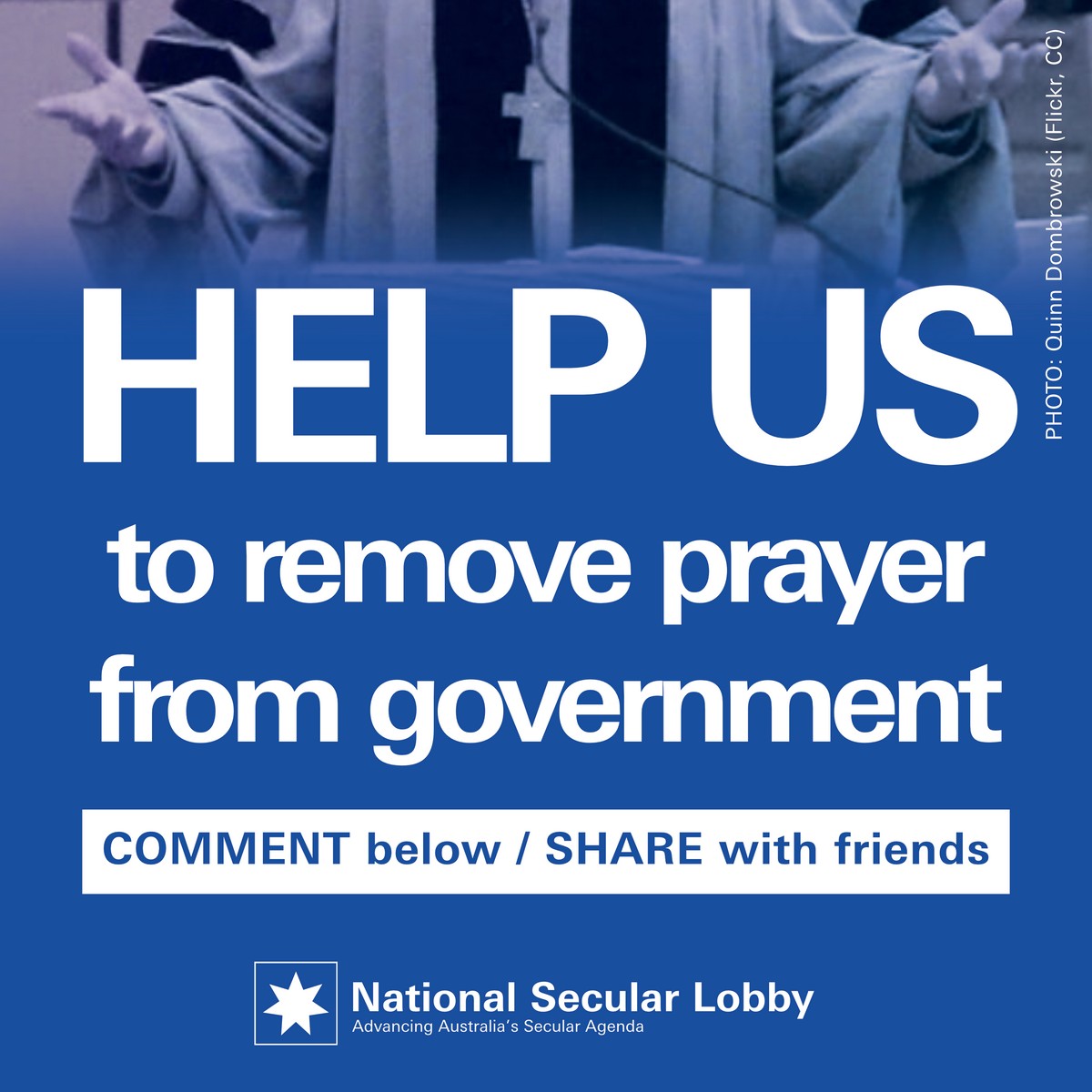Removing Prayers in Parliament
We want your help in removing prayers from all levels of government across the country!
It’s not just state and federal parliaments that recite prayers as part of official government proceedings; many local governments across Australia continue with this divisive, exclusionary practice.
As part of our #SecularGovernment campaign, we’re highlighting the problem of prayers and sermons being part of official government business. In recent weeks, we’ve published material from Brisbane City Council and neighbouring Redland City Council illustrating these practices.
But, with 537 councils across Australia, we don’t yet know how many other councils continue to privilege religion by including prayer rituals in their official meetings.
With your help, we’ll make a list of all the governments across Australia that continue to force elected representatives to take part in prayers during official government business.
We hope that the list will become a go-to resource for Australians who care about achieving separation of church and state.
THIS IS HOW YOU CAN HELP US:
- Go to the website of your local council and check if they have a section for prayers listed in their meeting agendas/minutes.
- Comment below to let us know if your council has the practice of reciting prayers (and don't forget to let us know which council you're talking about). Keep an eye on our list as we update it here.
- Contact your councillors to let them know that you disagree with the practice of including divisive and exclusionary prayers as part of official government business.
- Start a petition through your council calling on prayers to be removed, and let us know that you've done it!
- By going one step further and donating to us, you can help us to sponsor our social media posts to raise awareness of this issue in particular council areas. Make a contribution here: www.nationalsecularlobby.org/contribute/
National Secular Lobby president Peter Monk says the issue goes to the heart of who we are as a nation.
“Our Constitution states that governments should not make laws that impose religious observances. It is only through the technicality of the prayers being a standing order rather than a law that they survive,” he says.
“Many Australians are not Christian. A rapidly growing number of Australians say they do not have a religion at all. Yet, even when they attend their federal or state parliaments, or local government councils, they are asked to partake in Christian prayer rituals or, if they prefer, to leave the room during prayers.
“We don’t think it is acceptable for non-Christians who are elected by the public to be forced out of the room. All Australians have a right to religious freedom - including freedom from religion - and a right to participate equally in our government institutions. Our elected government bodies must start to respect this.”
This is another post in our #SecularGovernment campaign which is shining a spotlight on religious privilege in our armed forces.

More on Secular Government
Q&A with former Queensland MP Jann Stuckey
In this Q&A, former Queensland MP Jann Stuckey shares her thoughts about religion in politics and the rightward shift of the LNP.
Coming Up: Former MP Jann Stuckey on the LNP
In an interview to be published tomorrow, former MP Jann Stuckey shares her concerns about the shift of the LNP to the religious Right in Queensland.
Morrison Commits Australia to God
A leaked video shows Prime Minister Scott Morrison leading a private prayer session with Christian fundamentalists.
Governor-General Supports Divisive Prayer Day
Governor-General David Hurley has given his support for the National Day of Prayer & Fasting despite the divisive policies of the organisers.
No Secular Consultation in Labor’s RDB Plan
Regrettably, Labor Leader Anthony Albanese has so far opted not to extend that opportunity to secular, atheist, rationalist or humanist groups as part of public consultations on the divisive draft Religious Discrimination Bill.
Prayers in Parliament are counter to Religious Freedom
NSL President Peter Monk on the retention of prayers in our parliamentary procedures — and how this runs counter to the ideals of religious freedom.

At the National Secular Lobby, we're pleased to have joined forces with a number of pro-secular community organisations in the #DontDivideUs campaign against the proposed Religious Discrimination Bill. Add your voice to the campaign.

